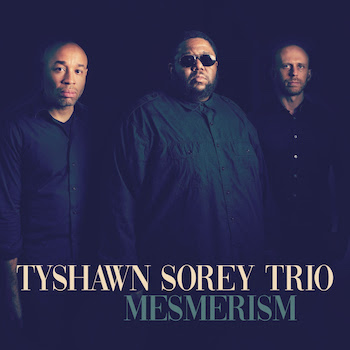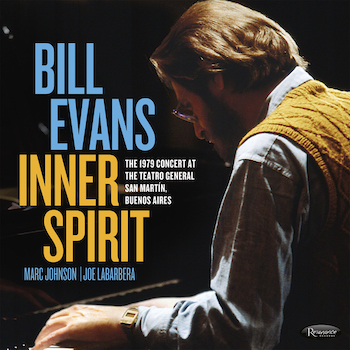Jazz Album Reviews: Trio Discs featuring Tyshawn Sorey and Bill Evans
By Steve Feeney
Percussionist Tyshawn Sorey has released a trio disc of standards that may very well be on my 2022 Best of the Year list, and a pair of “new” releases feature the legendary pianist Bill Evans.
Tyshawn Sorey Trio, Mesmerism (Yeros7 Music)
Bill Evans: Inner Spirit (Resonance Records)
Bill Evans: Morning Glory (Resonance Records)

The talents of MacArthur “genius” grant winner Tyshawn Sorey (b. 1980) have mostly struck me as a trifle rarefied. I keep pledging that I will give his many albums another chance after a first listen, but I seldom do.
Last year, Sorey collaborated with Vijay Iyer and Linda Oh on the trio disc Uneasy (ECM). (Arts Fuse review) There, finally, I could approach him as a drummer without having to first navigate the customary atmospherics and complexities. Others agreed — the album landed near the top of many Best-of-2021 polls.
Now, the burly percussionist has released a trio disc of standards that may very well be on my 2022 yearly list. Mesmerism features pianist Aaron Diehl and bassist Matt Brewer, both established but perhaps underappreciated pros, in a set of standards of various vintages.
Putting the disc on without really looking at it first, I was surprised by the opening cut. After the dramatic intro, I thought: Wait a minute, isn’t that a Horace Silver tune? It is, indeed — “Enchantment,” a piece originally on the 1956 album Six Pieces of Silver.
Silver’s gift of mixing up hard bop punch with lovely melodies comes in loud and clear. There’s also a noticeable nod to Ahmad Jamal in the lushness of Diehl’s chording over Brewer’s restless bass line. Meanwhile, Sorey shuffles and accents the juxtaposition to perfection.
Muhal Richard Abrams’s “Two Over One” continues to draw on the comfortable blend of personalities within this threesome. Abrams knew how to reach “out” without pulling too hard at the shapely sense of his pieces. You are never lost, but you have to lean into his work. As with the Silver tune, the rich rumble of the performances here admirably rewards repeated careful listening.
Paul Motian’s “From Time to Time” is given an edgier run through, with pianistic plinks and plunks, suspenseful grounding from the bass, and the leader’s assortment of taps and shimmers taking us to a quiet — though not entirely restful — place. A rewarding hint of consonance at the close is welcome.
Back on terra firma, the trio’s version of Duke Ellington’s “Rem Blues” swings nicely via a bass walk, its uncomplicated theme floating over Sorey’s deep-in-the-pocket pulse.
Sorey has expressed admiration for the work of pianist Bill Evans (1929-1980). Here, he offers a spacious, yet probing take on “Detour Ahead,” a classic tune Evans revisited during the early part of his career. But, for me,the feel of the master comes through more clearly during an extended workout of “Autumn Leaves,” where Sorey/Diehl/Brewer aim for rhapsodic bliss and supply it.
Speaking of Evans, there have been quite a few “new” releases featuring the pianist in recent years. A while back, I toyed with making the argument — though I ultimately reneged — that there can be too many of these posthumous “finds” (some of these sessions were available before, as bootlegs). Eventually, the fact that there is no Evans to discover troubles me more. Thankfully, we’re not there yet.
Two recent double CD releases feature the late, great pianist in live trio recordings from Buenos Aires in the ’70s.
 Inner Spirit was recorded in 1979 at the Teatro General San Martín with Marc Johnson (bass) and Joe LaBarbera (drums). The Johnson/LaBarbera unit was the last the pianist would perform with — his excesses were catching up with him. (LaBarbera, in his memoir Times Remembered: The Final Years of the Bill Evans Trio, written with Charles Levin, recounts Evans’s harrowing final years, as does Laurie Verchomin, Evans’s last girlfriend, in her book The Big Love: Life & Death with Bill Evans.)
Inner Spirit was recorded in 1979 at the Teatro General San Martín with Marc Johnson (bass) and Joe LaBarbera (drums). The Johnson/LaBarbera unit was the last the pianist would perform with — his excesses were catching up with him. (LaBarbera, in his memoir Times Remembered: The Final Years of the Bill Evans Trio, written with Charles Levin, recounts Evans’s harrowing final years, as does Laurie Verchomin, Evans’s last girlfriend, in her book The Big Love: Life & Death with Bill Evans.)
Despite the leader’s addiction to narcotics, LaBarbera noted that Evans could always, remarkably, rally at the keyboard and produce first-class music. This disc is a fine companion to what are perhaps the definitive performances of the same trio, which can be found on the two discs of The Paris Concert, which were recorded two months later.
Inner Spirit includes a few of the tunes that would make up the repertoire for the Paris recordings. There’s the lovely, sweet Evans original “Laurie,” dedicated to the aforementioned young lady who was there until, just short of a year after this recording, she and LaBarbera accompanied him on his final trip to the hospital.
The version of George Gershwin’s “I Loves You, Porgy” is an album highlight, thoughtfully paced and executed. And the oft-recorded “Nardis” is a thrill ride for all, especially LaBarbera.
A 1973 set, recorded at the Teatro Gran Rex and titled Morning Glory, features Evans with Eddie Gomez (bass) and Marty Morell (drums). The emphasis is, not uncharacteristically, on romance. Two favorites for me here are “Who Can I Turn To?” and the transcendent “My Foolish Heart.” But it’s all accomplished music making and recorded well. Maybe this outing is a touch more relaxed than the later concert. Or is that ease projected by the listener, knowing that there was still a while to go for Evans at that point?
Steve Feeney is a Maine native and attended schools in Maine, New Hampshire, and Massachusetts. He has a Master of Arts Degree in American and New England Studies from the University of Southern Maine. He began reviewing music on a freelance basis for the Portland Press Herald/Maine Sunday Telegram in 1995. He was later asked to also review theater and dance. Recently, he has added BroadwayWorld.com as an outlet and is pleased to now contribute to Arts Fuse.
Tagged: Bill Evans, Bill Evans: Inner Spirit, Bill Evans: Morning Glory, Resonance Records, Steve Feeney, Tyshawn Sorey
